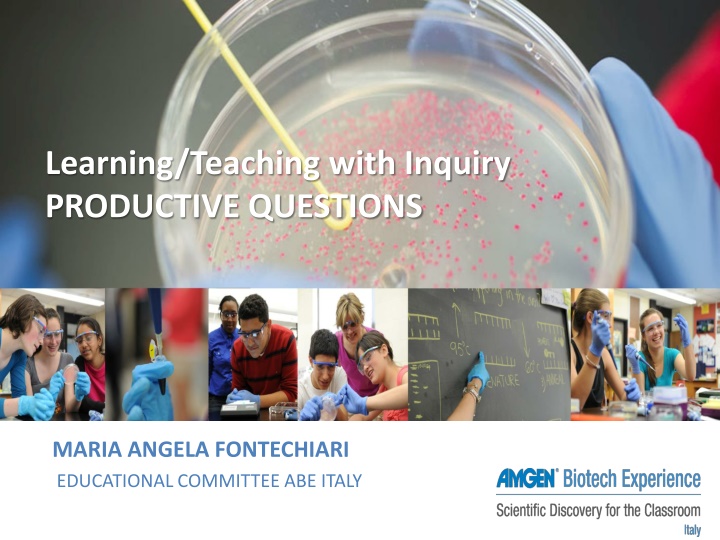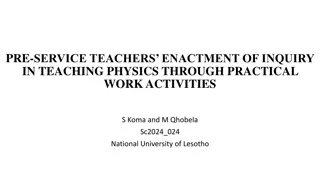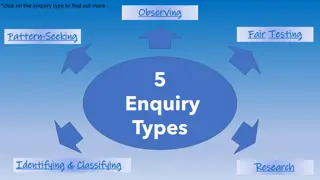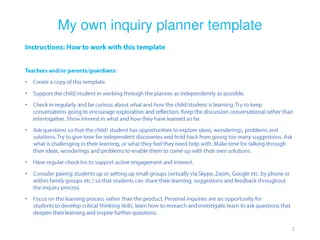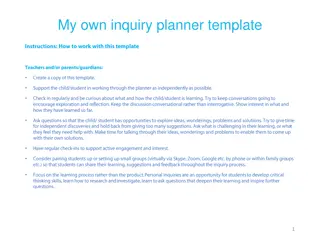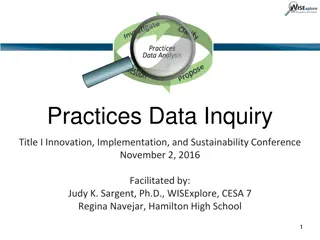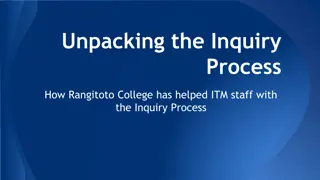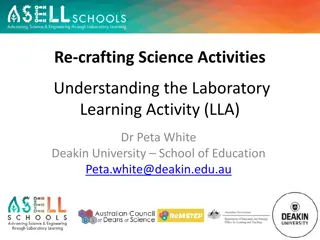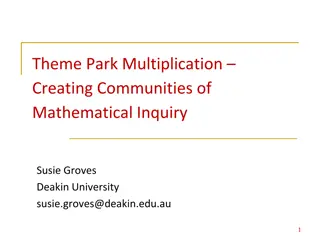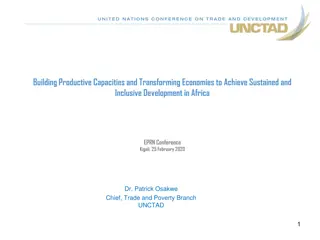Productive Questions in Inquiry Learning
Engage students in inquiry learning with productive questions that are scientifically related, connected to the curriculum, and investigable. Understand the requirements for creating investigable questions that encourage reasoning and are challenging yet meaningful in real-world contexts. Explore examples and methods for transforming questions into investigable ones.
Uploaded on Feb 19, 2025 | 0 Views
Download Presentation

Please find below an Image/Link to download the presentation.
The content on the website is provided AS IS for your information and personal use only. It may not be sold, licensed, or shared on other websites without obtaining consent from the author.If you encounter any issues during the download, it is possible that the publisher has removed the file from their server.
You are allowed to download the files provided on this website for personal or commercial use, subject to the condition that they are used lawfully. All files are the property of their respective owners.
The content on the website is provided AS IS for your information and personal use only. It may not be sold, licensed, or shared on other websites without obtaining consent from the author.
E N D
Presentation Transcript
Learning/Teaching with Inquiry PRODUCTIVE QUESTIONS MARIA ANGELA FONTECHIARI EDUCATIONAL COMMITTEE ABE ITALY
Questions in inquiry learning Students are engaged with productive question (NRC, 2000) communication involvement IBSE evidence evaluation explanations ABE site Italy/ Fontechiari M.A.
Productive questions - Scientifically related - Connected to the curriculum - Investigable ABE site Italy/ Fontechiari M.A.
INVESTIGABLE QUESTIONS Questions "appropriate" for an investigation, which can be answered through the analysis of data ABE site Italy/ Fontechiari M.A.
REQUIREMENTS for Investigable Questions - Are not notional (request for information) nor too complex and general (questions "Why..." ) - Do not provide an unambiguous answer - Encourage reasoning - Are related to meaningful, real-world contexts - Are challenging ABE site Italy/ Fontechiari M.A.
What are the investigable questions? 1. What are the main types of rocks? 2. Why are enzymes essential for cells? 3. What happens if a reaction occurs in the presence of enzymes? 4. How does temperature affect the density of substances? 5. Is the cell membrane semi-permeable? 6. How do I know if the membrane is semipermeable?
EXAMPLES of investigable and non-investigable questions 5. "Is the cell membrane semi- permeable?" permeable?" 5. "Is the cell membrane semi- 4. "How does temperature affect the density of substances?" density of substances?" 4. "How does temperature affect the 6. "How do I know if the membrane is semipermeable?" 3. "What happens if a reaction occurs in the presence of enzymes?" presence of enzymes?" 3. "What happens if a reaction occurs in the 1 "What are the main types of rocks?" types of rocks?" 1 "What are the main 2 "Why are enzymes essential for cells?" essential for cells?" 2 "Why are enzymes ABE site Italy/ Fontechiari M.A.
Transforming questions to make them investigable Variables scan (Jelly, 1985 ) ABE site Italy/ Fontechiari M.A.
TRANSFORM questions Variables scan (Jelly, 1985 ) Effective method for transforming "Why...?" questions. Analyze the "non-investigable" question to Identify variables related to the situation at hand Formulate "What happens if...?" questions by changing a variable each time More specific questions that can be answered through an investigation ABE site Italy/ Fontechiari M.A.
TRANSFORM questions Variables scan (Jelly, 1985 ) Effective method for transforming "Why...?" questions. Analyze the "non-investigable" question to Identify variables related to the situation at hand Formulate "What happens if...?" questions by changing a variable each time More specific questions that can be answered through an investigation ABE site Italy/ Fontechiari M.A.
TRAFORM questions Variables scan (Jelly, 1985 ) Effective method for transforming "Why...?" questions. Analyze the "non-investigable" question to Identify variables related to the situation under investigation Formulate "What happens if...?" questions by changing a variable each time More specific questions that can be answered through an investigation ABE site Italy/ Fontechiari M.A.
Modify questions Variables scan (Jelly, 1985 ) Why do plants grow? ABE site Italy/ Fontechiari M.A.
Why do plants grow? Analyze the "non-investigable" question to identify variables related to the situation under investigation Formulate questions 'What happens if...? ' changing variable each time The answer to these specific questions is possible through an investigation VARIABLES: Light Water Soil Nutrients What happens if the plants are in the dark? What happens if I stop watering the plants? What happens if you remove the plants from the soil and immerse them in water? What happens if you put the plant in a sandy substrate? What happens if you add nutrients to the soil? ABE site Italy/ Fontechiari M.A.
CRITERIA for productive applications - Availability of resources (materials and time) - Student Level - Related to topics that students are not familiar with ABE site Italy/ Fontechiari M.A.
CHECK LIST for productive applications Is it investigable? Is it interesting, challenging, stimulating for students? Is it adequate in terms of difficulty, time, and materials? Is the answer unknown to students? ABE site Italy/ Fontechiari M.A.
Productive Questions - How to make it meaningful for students? - How to highlight its relevance? - Who is proposing the productive question? - If it is proposed by the teacher, how to introduce it? ABE site Italy/ Fontechiari M.A.
Relevance to investigable questions - Require students to note the question - Write the question on a poster board to display in the classroom - Recall the question at the beginning and during activities ABE site Italy/ Fontechiari M.A.
Productive Questions - How to make it meaningful for students? - How to highlight its relevance? - How to stimulate students to formulate investigable questions? - Who proposes the investigable question? - If it is proposed by the teacher, how to introduce it? ABE site Italy/ Fontechiari M.A.
STIMULATE investigable questions - Show examples - Propose dedicated activities - Allow time to think and reflect and provide for individual, pair and group activities - Avoid making judgments - Bringing out pre-knowledge ABE site Italy/ Fontechiari M.A.
KWL (Know, Wonder, Learn) TABLES ABE site Italy/ Fontechiari M.A.
CHECK LIST for productive questions Does the question clarify what I need to do (observe, measure, ...) to answer? Am I able to get the materials I need to answer the question? Does the time I have available coincide with the time I actually need to answer the question? Am I interested in answering this question? Do I already know the answer to this question? ABE site Italy/ Fontechiari M.A.
Thank you for your attention! 28
